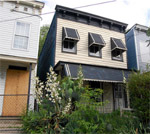 House flipping is back, and this time local nonprofits want in on the game.
House flipping is back, and this time local nonprofits want in on the game.
Richmond’s Neighborhood Stabilization Program recently received $5 million, its third infusion of funds from the Virginia Department of Housing and Community Development. The funds will be used to purchase, renovate and ultimately sell deserted and foreclosed properties in the Church Hill, Barton Heights and Highland Park areas.
Renovations are underway on 20 properties and are expected to be complete within a few months. The upgraded properties will be sold or rented to people with low incomes.
“Our responsibility is to determine which areas have been impacted the most and rehab them to a livable and sellable state,” said Chris Thompson, program manager for the DHCD.
Funds for the stabilization program are made available through the Housing and Economic Recovery Act of 2008. The federal funding has been distributed to states, which have allocated it to localities to award to housing groups. The federal program is designed to reduce the effects on communities caused by the foreclosure crisis.
Many of the DHCD’s community development programs focus only on lower income households, but Thompson said Richmond’s program will cater to middle class households as well.
“The foreclosure crisis is hitting a broader spectrum of society, and [the stabilization program] can provide assistance to a variety of income groups,” Thompson said.
To date, 21 local government and nonprofit organizations have worked with the program to acquire and renovate foreclosed properties and sell them to potential homeowners. Richmond Metropolitan Habitat for Humanity, Bradley Development LLC, Richmond Redevelopment and Housing Authority and Southside Community Development and Housing Corporation
are helping with the current renovations.
“We’ve purchased seven homes that have been foreclosed on,” said Dianna Herdon, executive director for Southside Community Development and Housing Corporation.
The community development nonprofit provides home-ownership education and counseling, home repairs and other financial support services to these first-time home buyers.
“We recently just sold our first home, located at 1805 Rose Ave.,” Herdon said.
About 70 homes have been purchased by grant recipients. Statewide, 35 houses have been sold out of 216 that have been renovated. Grantees design their own programs and funding criteria, but they must use at least a quarter of the funds toward the purchase of the property.
 House flipping is back, and this time local nonprofits want in on the game.
House flipping is back, and this time local nonprofits want in on the game.
Richmond’s Neighborhood Stabilization Program recently received $5 million, its third infusion of funds from the Virginia Department of Housing and Community Development. The funds will be used to purchase, renovate and ultimately sell deserted and foreclosed properties in the Church Hill, Barton Heights and Highland Park areas.
Renovations are underway on 20 properties and are expected to be complete within a few months. The upgraded properties will be sold or rented to people with low incomes.
“Our responsibility is to determine which areas have been impacted the most and rehab them to a livable and sellable state,” said Chris Thompson, program manager for the DHCD.
Funds for the stabilization program are made available through the Housing and Economic Recovery Act of 2008. The federal funding has been distributed to states, which have allocated it to localities to award to housing groups. The federal program is designed to reduce the effects on communities caused by the foreclosure crisis.
Many of the DHCD’s community development programs focus only on lower income households, but Thompson said Richmond’s program will cater to middle class households as well.
“The foreclosure crisis is hitting a broader spectrum of society, and [the stabilization program] can provide assistance to a variety of income groups,” Thompson said.
To date, 21 local government and nonprofit organizations have worked with the program to acquire and renovate foreclosed properties and sell them to potential homeowners. Richmond Metropolitan Habitat for Humanity, Bradley Development LLC, Richmond Redevelopment and Housing Authority and Southside Community Development and Housing Corporation
are helping with the current renovations.
“We’ve purchased seven homes that have been foreclosed on,” said Dianna Herdon, executive director for Southside Community Development and Housing Corporation.
The community development nonprofit provides home-ownership education and counseling, home repairs and other financial support services to these first-time home buyers.
“We recently just sold our first home, located at 1805 Rose Ave.,” Herdon said.
About 70 homes have been purchased by grant recipients. Statewide, 35 houses have been sold out of 216 that have been renovated. Grantees design their own programs and funding criteria, but they must use at least a quarter of the funds toward the purchase of the property.



I think they mean 1805 Rose as their first house sold.
Yep, no blight on that block on Grove!